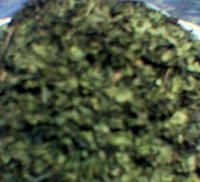Bitter Leaf
Bitter leaf is derived from the leaves of a small ever-green shrub found all over Africa called Vernonia, belonging to the family Asteraceace.
There are over a thousand species of this crop. Vernonia amygdaline is commonly found in West Africa, and Vernonia galamensis in East Africa.
True to its name, this leaf is bitter to taste, but surprisingly delicious in meals.
Other names with which this plant is known includes:
• Orugbo (amongst the Itsekiri and Urobo tribes in Nigeria)
• Onugbo
• Ewuro
• Mojunso (East Africa – especially Tanzania)
The leaf can be eaten fresh like spinach is soup or dried too. African cuisines featuring this leaf as ingredients include:
• Ogbono soup
• Okra and bitter leaf soup
In many parts of West Africa, the leaves are used to wash slime off fish and snail before been cooked.
The roots and twigs are eaten as appetizer too.
Medicinal Value
These leaves have great nutritional, herbal and medicinal value.
It is contains very high amount of zinc, important in many enzyme function and keeping the skin fresh.
So have claimed that this leaf may be dangerous to eat. There are no convicing studies to proof this.
As a general guide, washing your leaf very well and by so doing, you remove saponins to concentrations that are okay for the body to handle.
They also contains saponins and tannins (glycosides), as well as alkaloids. At least 13 other new compounds or vital ingredients have been found in these leaves, after a 40 years study, and have the following benefits:
• Ant-imalaria
• Anti-bacteria
• Anti-parasites
• Anti-cancer.
It is also effective in preventing indigestion, scurvy, sciatica, and rheumatism.
At least 30 different illnesses have been suggested to be curable with the use of bitter leaf herbs.
You can get dried bitter leaf from an african food shop, or order from here and get it delivered to you any where in the UK.
Want regular updates on African cuisines and food recipes? What about unique health information about these foods - what to eat and avoid to keep healthy from the list of African recipes available?
Fill in the form below to subscribe to our Newsletter - AfricanFoods Weekly?
Worried about spamming? We are too. We will never ever give or pass on your information to anyone else. We will only use your email address to send you your copy of our weekly newsletter. We do have a zero tolerance to spam. We subscribe to a very strict policy on the handling and use of information we gather on this site! We also get paid for affiliate links on this site. See our privacy policy for further details.
Follow us on social media:
Get Our Weekly Newsletter. Subscribe Today. It's FREE.
Subscribe to African Foods Weekly
Get African food recipes, cooking tips, and healthy eating info delivered to your inbox every week. Simply fill in your email below and click SUBSCRIBE .
(Your information will not be shared)







New! Comments
Have your say about what you just read! Leave me a comment in the box below.